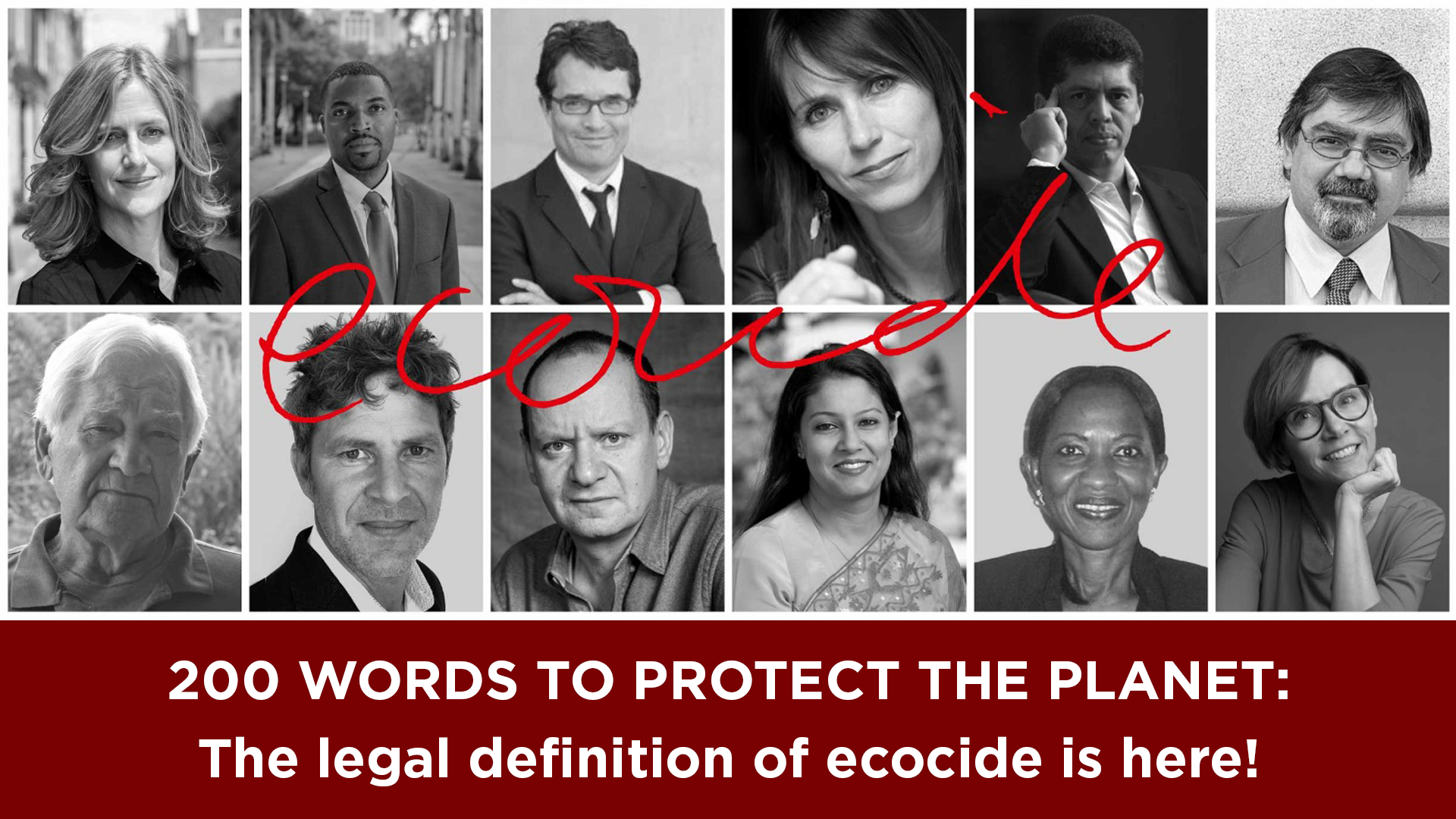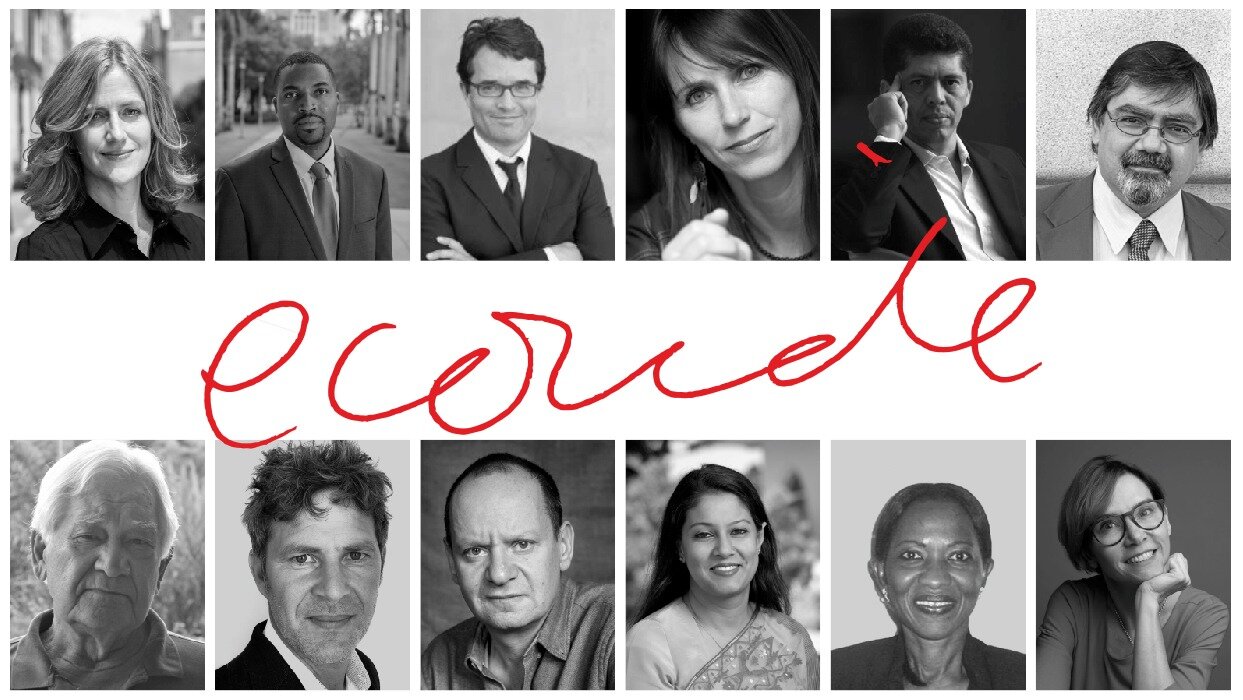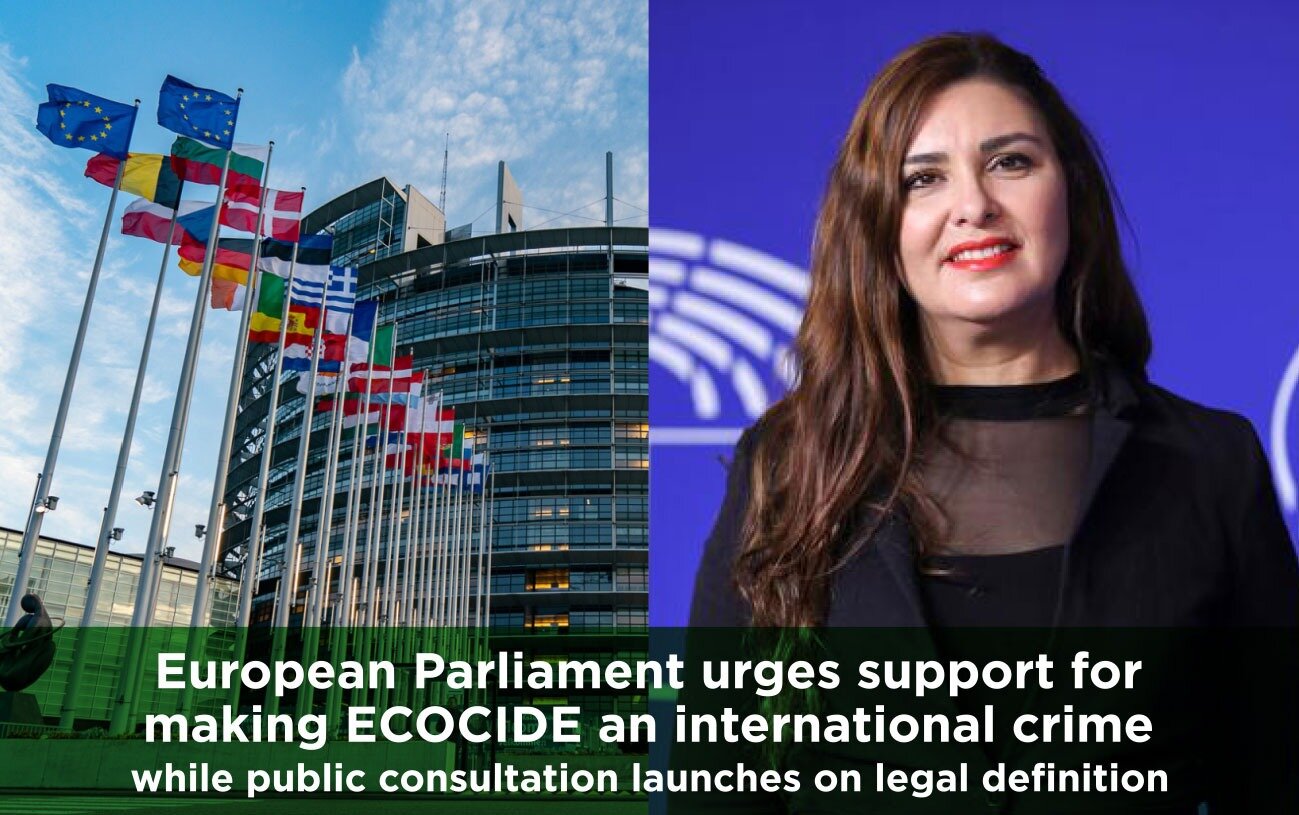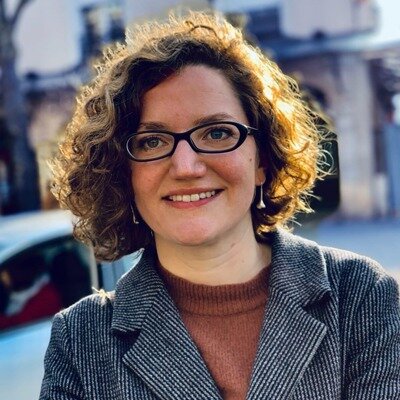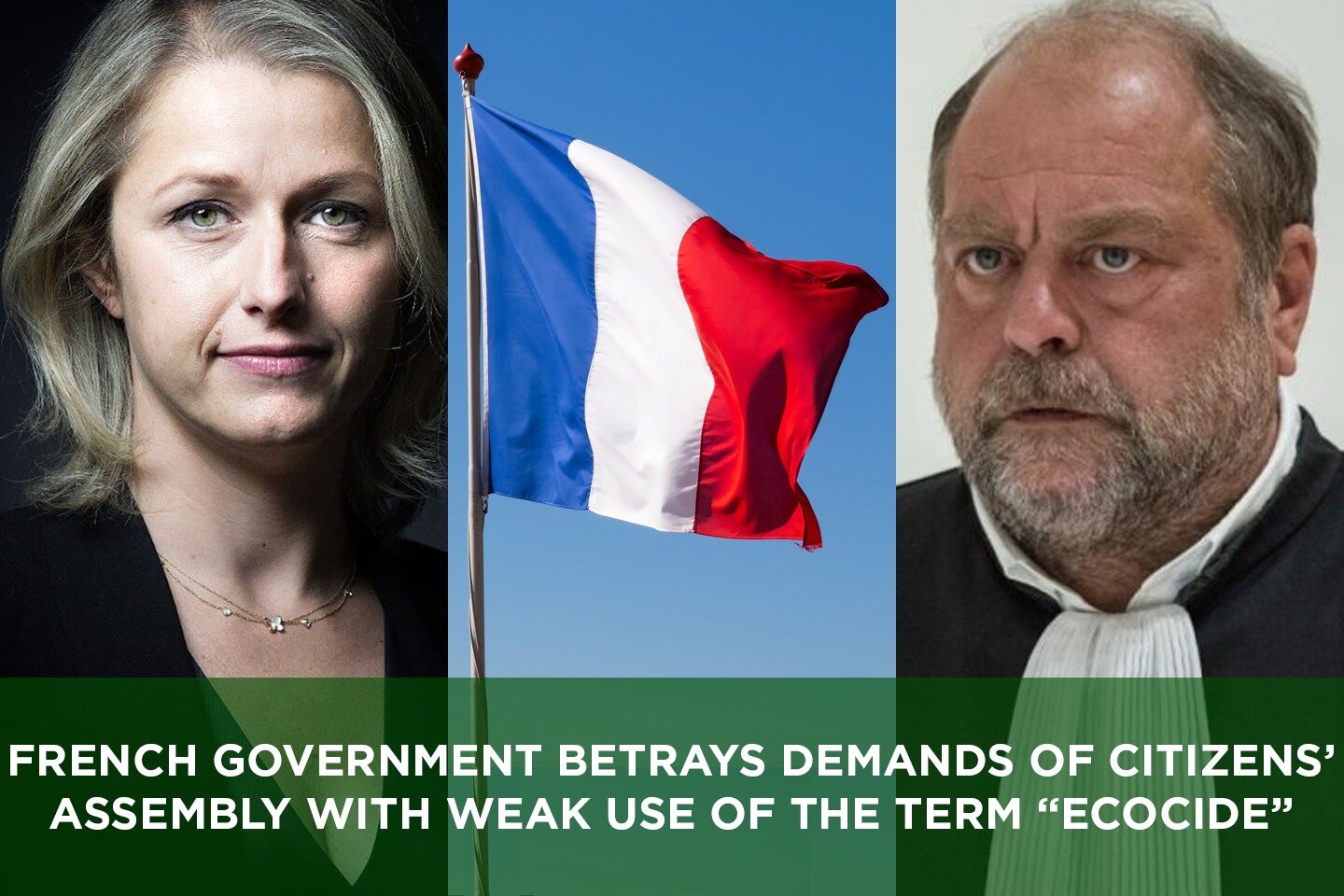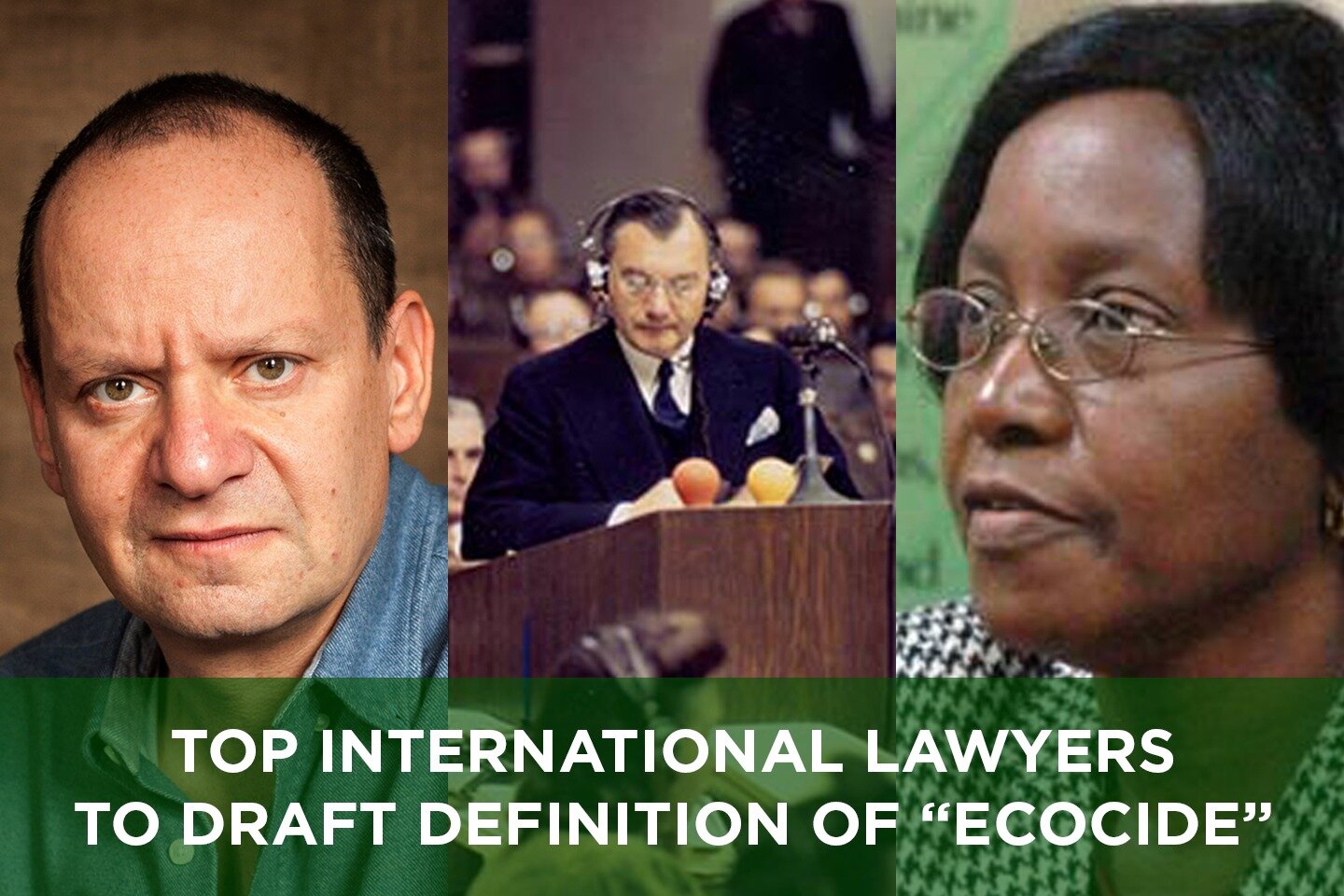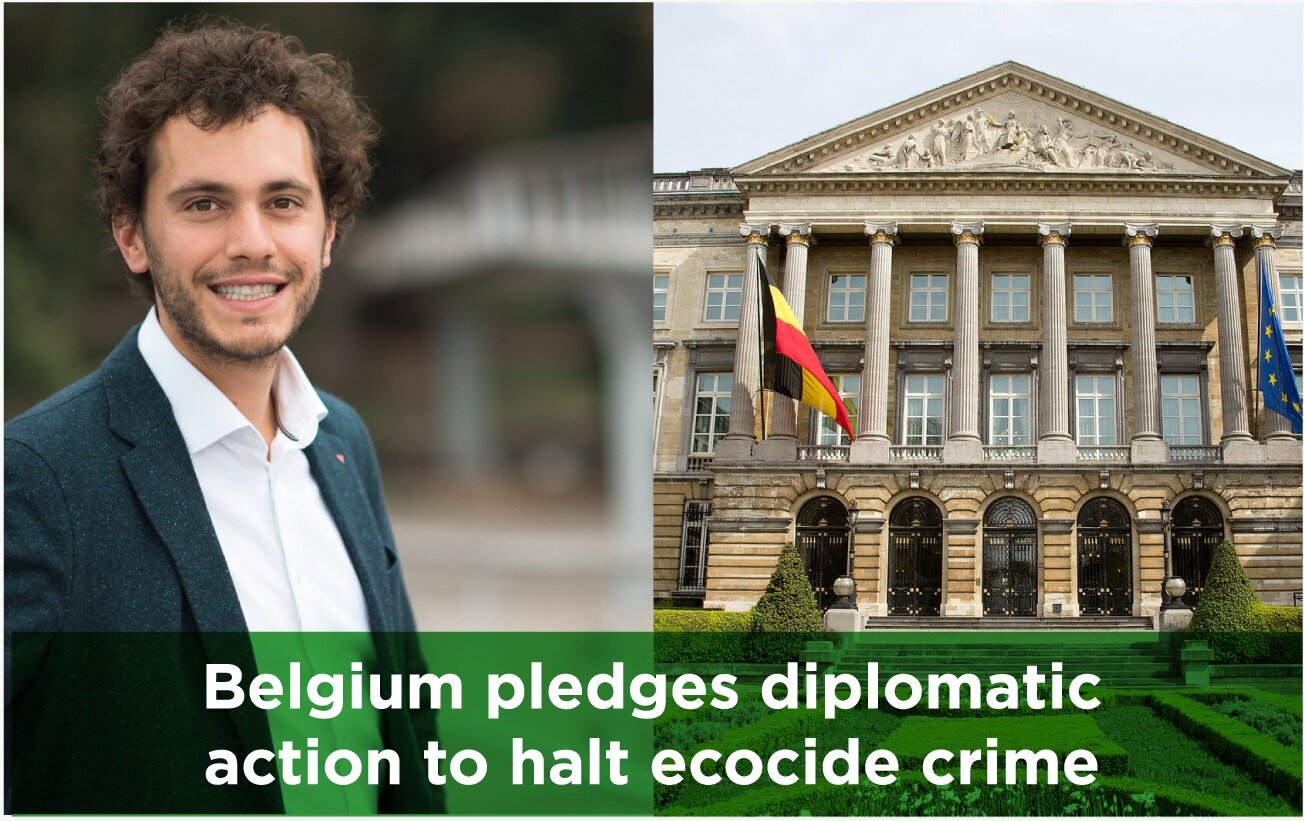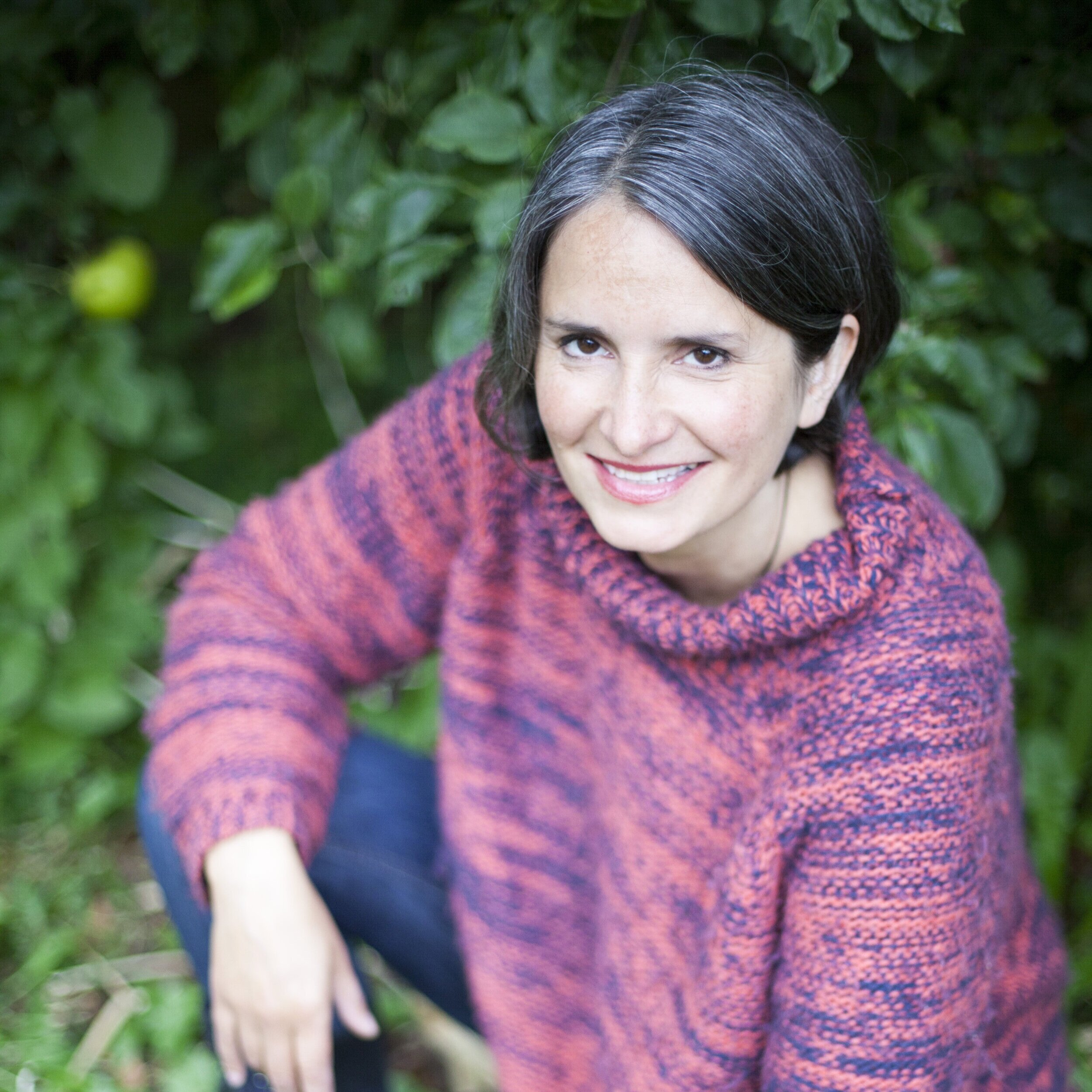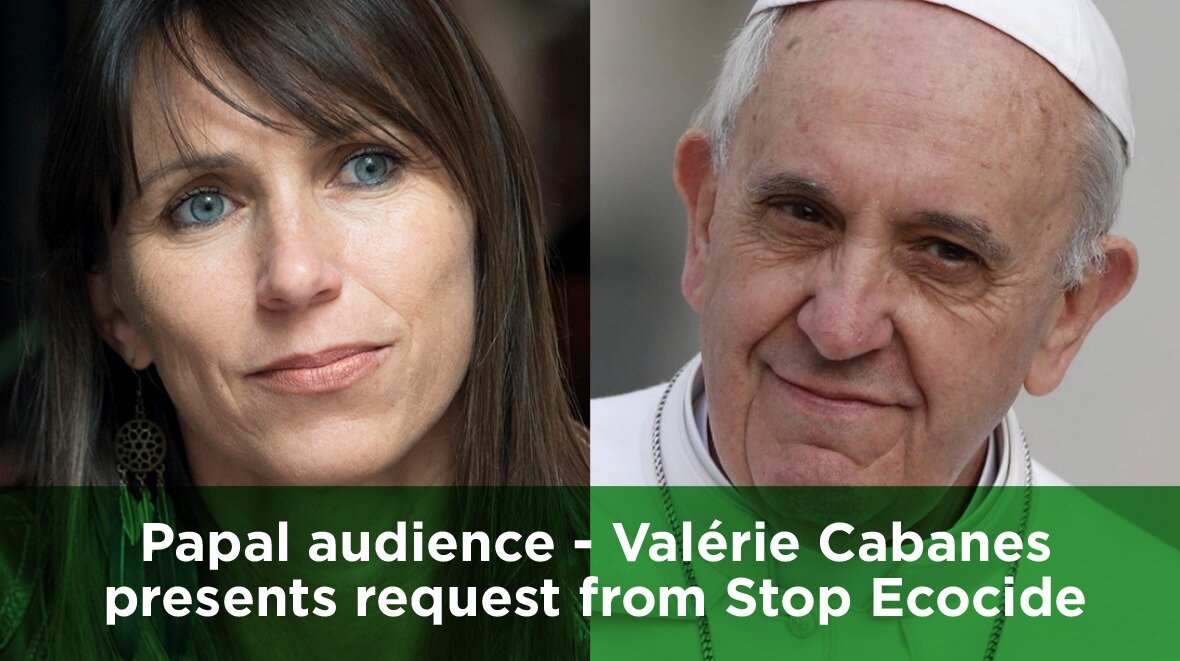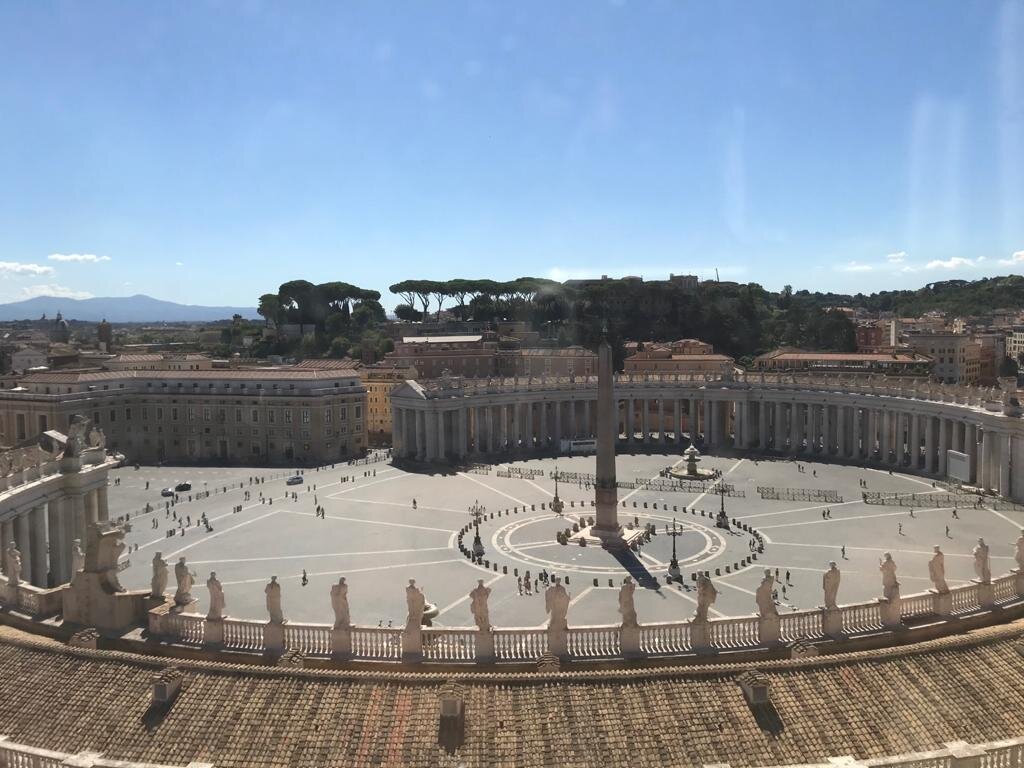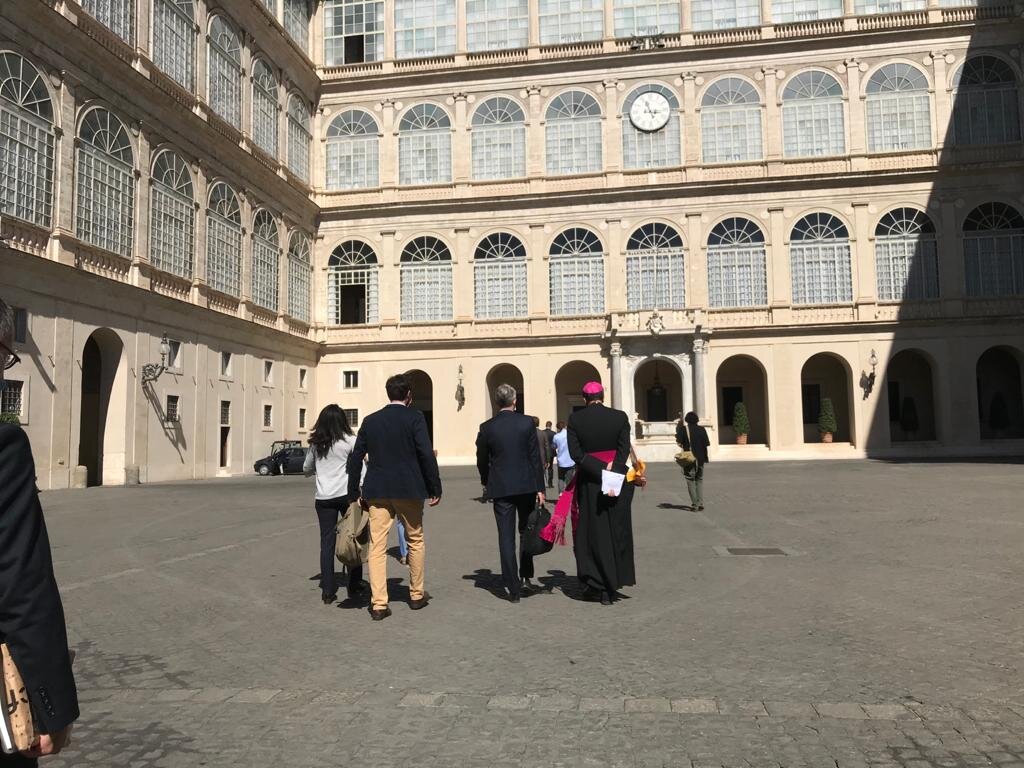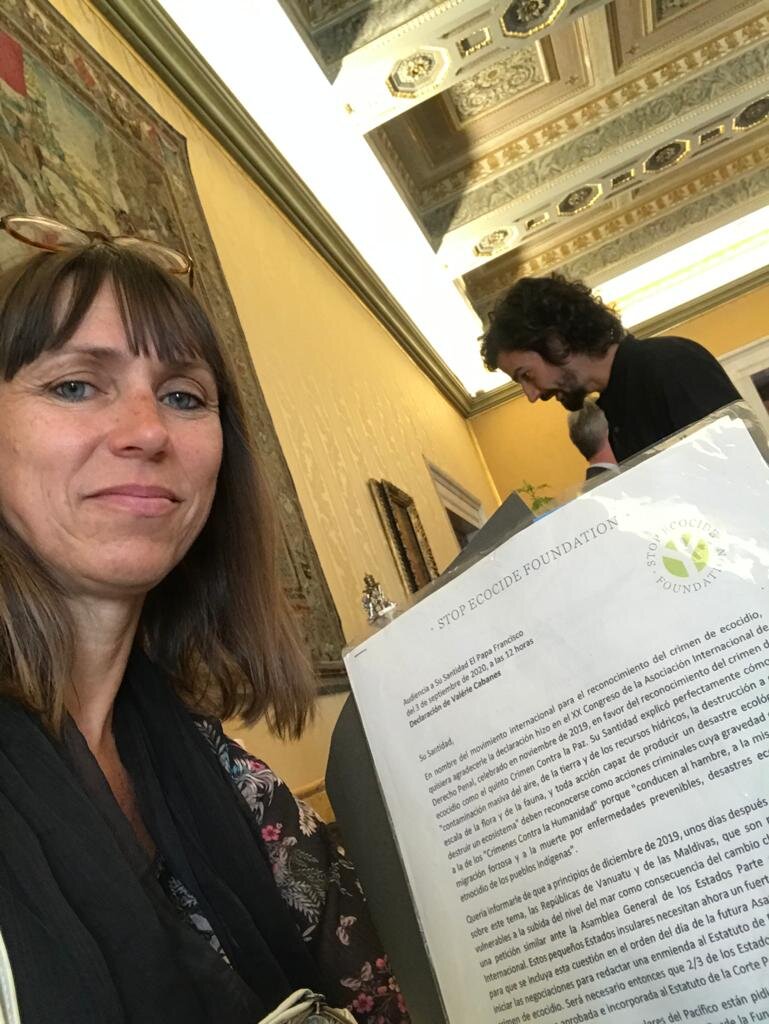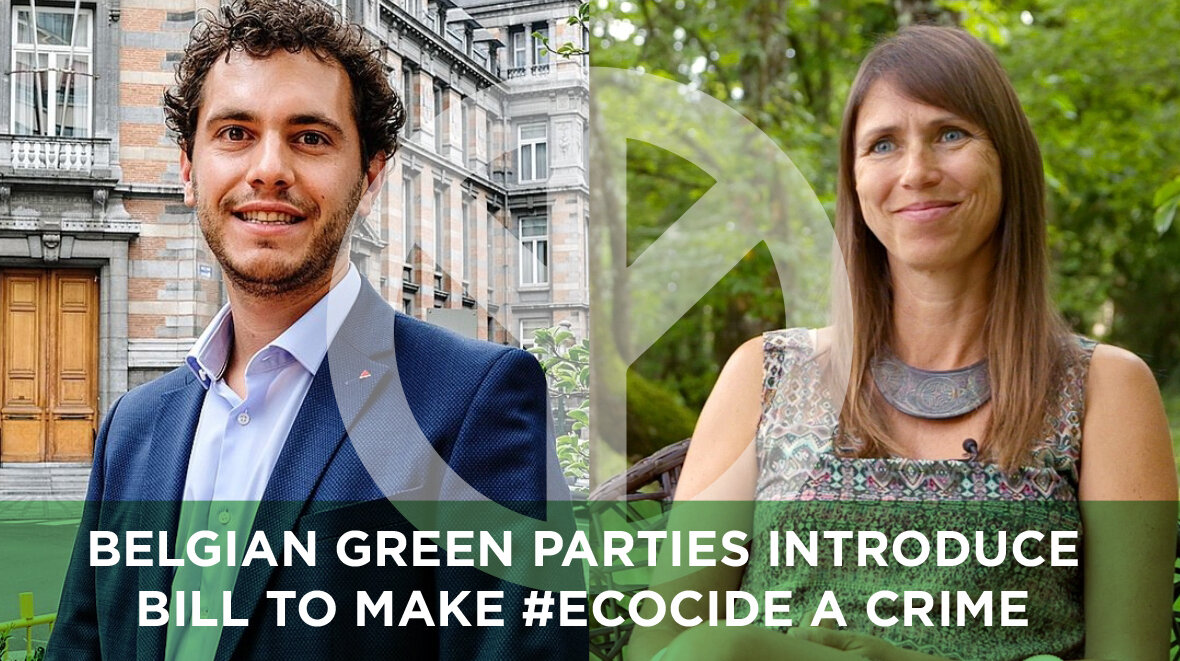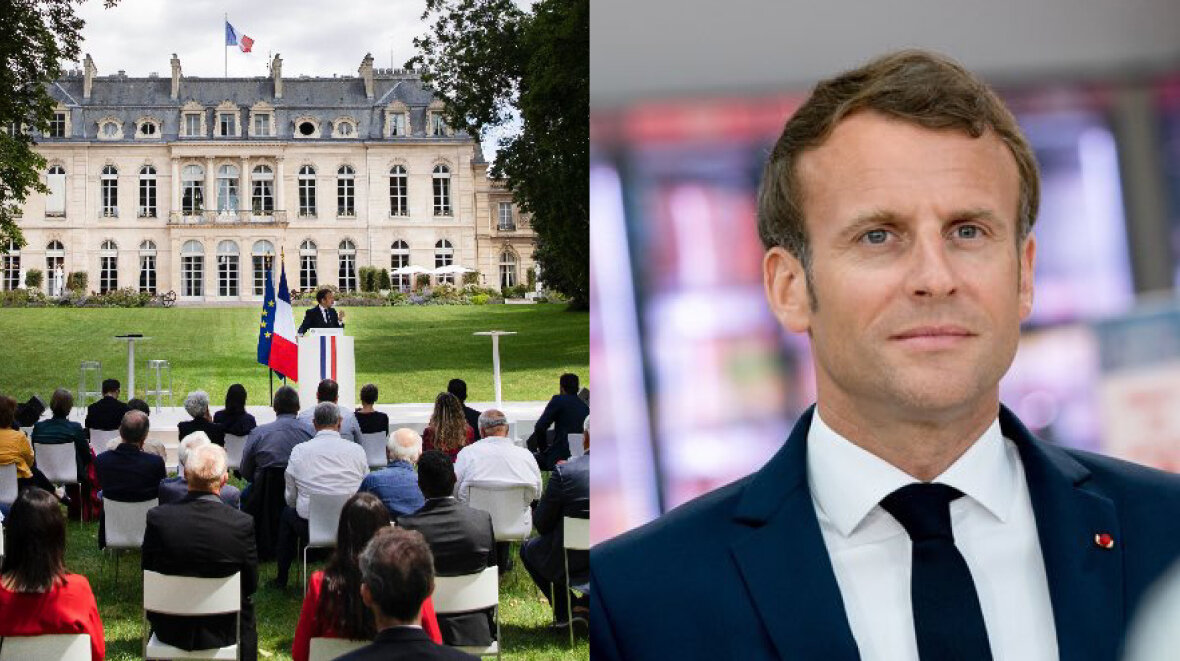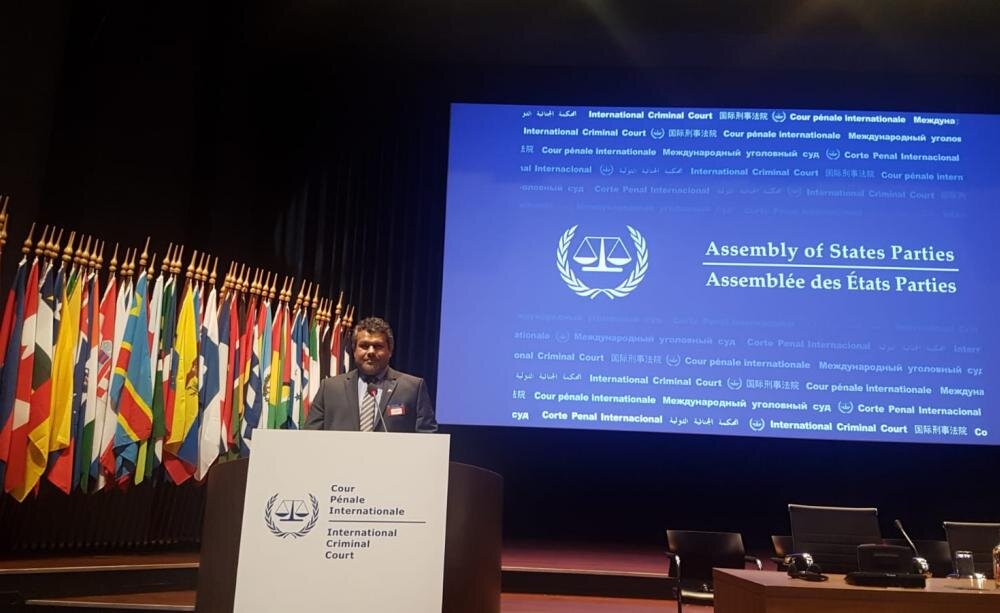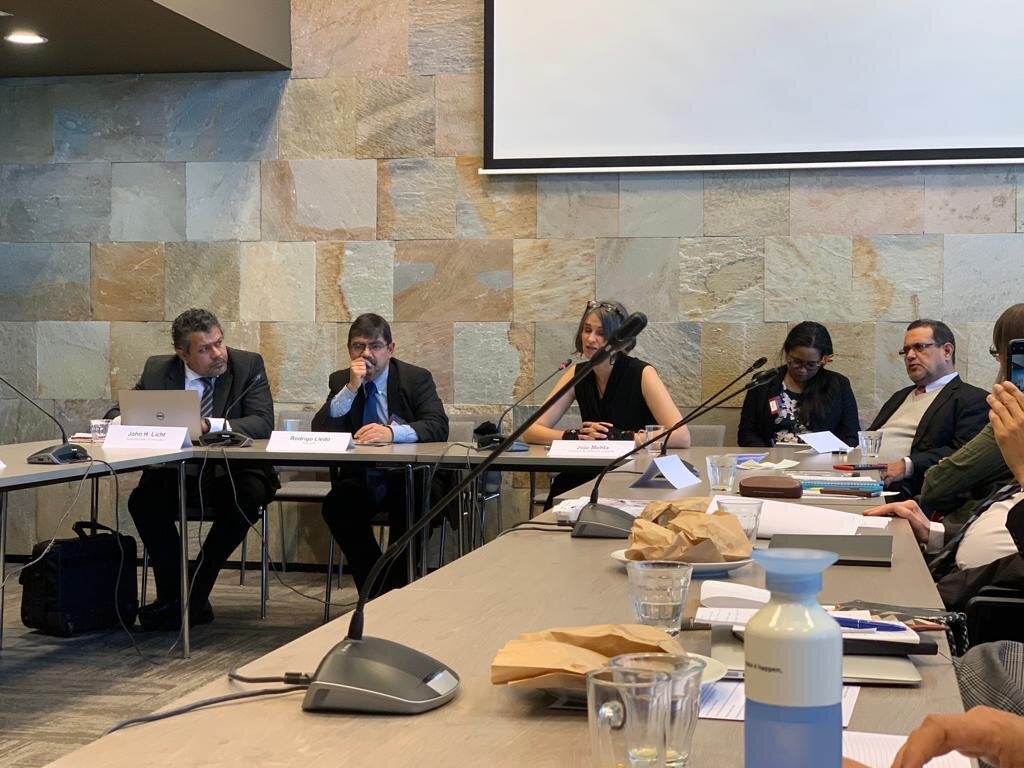Top international lawyers unveil definition of "ecocide"
Commissioned by the Stop Ecocide Foundation, an expert drafting panel of 12 highly renowned international criminal and environmental lawyers from around the world has just concluded six months of deliberations. The result: a legal definition of “ecocide” as a potential 5th international crime, to sit alongside genocide, crimes against humanity, war crimes and the crime of aggression.
Global expert drafting panel reveals proposal for a fifth crime under the Rome Statute of the International Criminal Court
Commissioned by the Stop Ecocide Foundation, an expert drafting panel of 12 highly renowned international criminal and environmental lawyers from around the world has just concluded six months of deliberations. The result: a legal definition of “ecocide” as a potential 5th international crime, to sit alongside genocide, crimes against humanity, war crimes and the crime of aggression.
The Independent Expert Panel for the Legal Definition of Ecocide, chaired by barrister and author Philippe Sands QC (UK) together with UN jurist and former prosecutor Dior Fall Sow (Senegal), was convened in late 2020 at a powerfully symbolic moment, 75 years after the terms “genocide” and “crimes against humanity” were first used at Nuremberg. The project emerged in response to a request from parliamentarians in the governing parties of Sweden.
The proposed definition will now be made available for states to consider, and will henceforth be visible on the newly launched Ecocide Law website, an academic and legal resource hub co-managed by the Stop Ecocide Foundation and the Promise Institute for Human Rights at UCLA School of Law.
Jojo Mehta, Chair of the Stop Ecocide Foundation and convenor of the panel, said: “This is an historic moment. This expert panel came together in direct response to a growing political appetite for real answers to the climate and ecological crisis. The moment is right - the world is waking up to the danger we are facing if we continue along our current trajectory.”
The drafting work, she explained, “was high-level, collaborative and informed by many experts as well as a public consultation comprising hundreds of legal, economic, political, youth, faith and indigenous perspectives. The resulting definition is well pitched between what needs to be done concretely to protect ecosystems and what will be acceptable to states. It's concise, it’s based on strong legal precedents and it will mesh well with existing laws. Governments will take it seriously, and it offers a workable legal tool corresponding to a real and pressing need in the world.”
Rebecka Le Moine, Member of Swedish Parliament, who initially approached the Stop Ecocide Foundation with a request for a definition of ecocide, said:
“I welcome this definition, as it makes the term ecocide more concrete and clear, it also makes it a lot easier for me as a politician and a lawmaker to find support for criminalization of it.”
Quotes from the panel co-chairs:
Philippe Sands QC, Professor, University College London; barrister, Matrix Chambers; author, East West Street: On the Origins of Genocide and Crimes against Humanity (UK/France/Mauritius):
“It has been a privilege to contribute to this work, inspired by the efforts of Hersch Lauterpacht and Rafael Lemkin in giving the world ‘crimes against humanity' and ‘genocide’, back in 1945. Ecocide is about law in the service of our planet, a means of changing consciousness and of harnessing the idea and ideals of international justice for the greater good.”
Dior Fall Sow, UN jurist and former prosecutor (Senegal):
“This is the beginning of a difficult but exhilarating adventure that should only end with the introduction into the Rome Statute of this fifth crime of ecocide. Let's dare to do it!”
[Additional panelists’ quotes below.]
Support for an ecocide law criminalising mass damage and destruction of ecosystems is gaining momentum around the world with recorded interest from both island nations (Vanuatu and the Maldives) and European states (France, Belgium, Finland, Spain, Luxembourg). It has been endorsed by high-profile figures such as the Pope, Greta Thunberg and Dr Jane Goodall. Belgium is the first European nation to have raised criminalizing ecocide at the International Criminal Court, and the European Parliament has now supported in principle on several occasions.
MEP Marie Toussaint who has made it her mission to progress recognition of ecocide by the EU, is delighted: “After years and years of non-stop mobilisation and struggle all over the world, recognition of ecocide has gained strength and public support. This recognition is essential if we want to protect all life on our planet, as well as peace and human rights.”
She continued: “This highly qualified panel has shown today not only that this is legally feasible, but also that we can have a shared international understanding and definitions. Our role now, as parliamentarians from all over the world, is to work towards legal recognition in every single state along with support for this amendment to the Rome Statute. You can count on me for that! Justice and nature will prevail!”
There is currently no legal framework to deal with ecocide at an international level, and therefore no system to hold corporate and government decision-makers accountable for environmental damages and abuses such as oil spills, mass deforestation, ocean damage or severe pollution of waters. Enshrining ecocide in international law would enable perpetrators to be put on trial at the International Criminal Court or in any ratifying jurisdiction.
You can keep up to date with Stop Ecocide International and the work of the Stop Ecocide Foundation on: Twitter, LinkedIn, Facebook and Instagram.
****ENDS****
Interview requests etc: press@stopecocide.earth
Website: www.stopecocide.earth
Comment (Stop Ecocide): Jojo Mehta +44 7746 395323 (whatsapp) jojo@stopecocide.earth
Notes to Editors
The Stop Ecocide Foundation both advocates for and facilitates steps towards making ecocide a crime at the International Criminal Court (ICC) in order to prevent devastation of nature and so protect the future of life on Earth. It is the only global NGO with this exclusive focus.
The Foundation has an expanding network of communication teams around the globe and websites in multiple languages. A growing number of ICC member states (as well as the Pope and the European Parliament) have publicly expressed interest in an international crime of ecocide.
This progress has been actively facilitated by Stop Ecocide’s campaign narrative alongside strong legal, diplomatic and grassroots collaborations. The work of the Foundation sits at the intersection of these three areas, and is thus uniquely positioned both to support and to amplify the global conversation.
Assets:
Expert panel photographs
Ecocide Law website - just launched: a comprehensive and growing resource hub of academic and legal material, including historical timeline and publications relating to ecocide.
FAQs
Additional panelist quotes:
Deputy Chairs:
Kate Mackintosh, Executive Director, Promise Institute for Human Rights, UCLA School of Law (US/UK):
“This is an exciting moment for us all, as we emerge with a practical definition of ecocide that is both timely and overdue. I believe this legally robust and credible text can take its place alongside the other international crimes, and signal a sea change in our attitudes to the protection and preservation of our planet.”
Richard J Rogers, Partner, Global Diligence; Executive Director, Climate Counsel (UK)
“ ‘Ecocide’ is a criminal law for the 21st Century. If humanity is to reach the 22nd Century with peace and security, we must tame the environmental abuse that has plagued the earth for hundreds of years.”
Panelists:
Valérie Cabanes, International jurist and human rights expert (France):
“We need to broaden the range of the most serious international crimes by recognising a fifth crime against the peace and security of humanity: the crime of ecocide. By destroying the ecosystems on which we depend, we are destroying the foundations of our civilisation and mortgaging the living conditions of all future generations. This is no less serious than war crimes, crimes against humanity, or the crimes of genocide or aggression. As well as being a major issue of global socio-environmental justice, is it not ultimately the survival of the human species that is at stake?
Pablo Fajardo, Environmental lawyer (Ecuador):
“It is imperative to recognize that ecocide is a global threat and needs to be responded to accordingly. We are pleased to be part of this Panel because it has managed to propose a legal formula capable of addressing these types of threats.”
Syeda Rizwana Hasan, Director, Bangladesh Environmental Law Association (Bangladesh):
“We, in the global south, are witnessing massive destruction of natural systems in the name of development, against which national legal systems are not responding adequately. If forests are not protected, emission of greenhouse gases not curtailed and sea level rise not prevented, the next generation will have to draw maps of Bangladesh and other South Asian countries differently. We need recognition of ecocide in international law, to defend Mother Earth, nature and both present and future generations.”
Charles C Jalloh, Professor, Florida International University/UN International Law Commission (Sierra Leone):
“It has been wonderful to work with such a great team of international law scholars and practitioners on this independent expert panel for the definition of a new crime of ecocide. I am pleased that, despite our diverse backgrounds and expertise, we reached a consensus definition. I am hopeful that the outcome will prove useful to States. And that it might even catalyze a much needed amendment to the Rome Statute of the International Criminal Court to finally include ecocide in the list of most serious crimes of concern to the international community as a whole.”
Rodrigo Lledó, Director, Fundación Internacional Baltasar Garzón (Chile/Spain):
“The intellectual generosity of the panel members was truly surprising and motivating, and enabled us to reach a balanced definition. I hope that the States will adopt this definition as their own. It is urgent. Destroying the environment in a massive and irresponsible way must cease to be internationally legal.”
Tuiloma Neroni Slade, Former ICC judge (Samoa):
“The panel's proposals are based on established principles of law and are aimed at strengthening the ability of the ICC to respond to matters of the utmost seriousness to the international community. It has been a special privilege to take part in the work of such a highly committed and distinguished international panel."
Christina Voigt, Professor, University of Oslo (Norway):
“The definition is a tool to which we applied our collective expertise in the conviction that severe destruction of the environment needs to stand on par with other international crimes. It is a tool we can only hope governments will find useful in their future deliberations.”
Alex Whiting, Former International Criminal Court prosecutions coordinator; Professor, Harvard Law School (US):
"Defining the crime is a first step on a path of discussion, debate, and, one day, ratification. The hope is that the process will energize states to think about how to use international criminal law to target the most grave environmental crimes while at the same time deploying domestic criminal and regulatory law to address a broad range of environmental harms that threaten our planet."
The Stop Ecocide Foundation is a registered foundation in the Netherlands with charitable (ANBI) status. Registered address: Nieuwe Herengracht 18, 1018DP, Amsterdam. Postal address: Postbus 601, 1180 AP Amstelveen. Registered foundation number: 76532054.
European Parliament votes to take ecocide law seriously
At the European Parliament this week, the movement to criminalize mass damage and destruction of nature or “ecocide” took a surge forward with strongly supportive votes on two key reports.
Two reports adopted this week support criminalization of “ecocide” at EU and international levels
At the European Parliament this week, the movement to criminalize mass damage and destruction of nature or “ecocide” took a surge forward with strongly supportive votes on two key reports.
One was from the Legal Affairs committee on the liability of companies for environmental damage, and urged the European Commission to “study the relevance of ecocide to EU law and EU diplomacy” (para 12) - a significant step, long advocated by MEP Marie Toussaint (Greens/EFA, above right), who co-ordinates the Ecocide Alliance, an international alliance of parliamentarians for the recognition of ecocide. This comes not long after the prestigious European Law Institute approved a project to draft a model ecocide law for potential application in the EU.
“The European Union must keep its promise to be a global leader on justice and protection of the living world,” said Ms Toussaint. “We’ve worked tirelessly to have ecocide discussed and adopted. The moment has come to condemn it as a serious crime.”
She continued: “It may take some time to establish concrete recognition in European law, but we will not let this Parliamentary demand go unnoticed. The European Commission and all European leaders must act - and we will make sure of it.”
Meanwhile, another report from the Foreign Affairs committee on the effects of climate change on human rights and the role of environmental defenders on this matter resolved to encourage “the EU and its Member States to take a bold initiative ... to pave the way within the International Criminal Court (ICC) towards new negotiations between the parties with a view to recognising ‘ecocide’ as an international crime under the Rome Statute” (para 11). This approach to criminalizing ecocide is precisely that pursued by Stop Ecocide International, the global campaign co-founded by Jojo Mehta (above left) and visionary UK barrister the late Polly Higgins.
“It is hugely encouraging to see the European Parliament taking ecocide seriously,” said Mehta. “Politicians around the world are waking up to the fact that we are collectively heading for disaster if we don’t rapidly correct our course. An enforceable deterrent such as criminal law can provide that course correction. A crime of ecocide would create a guardrail for corporate practice, and also empower governments to better enforce existing laws. It’s long overdue.”
Mehta is convenor of the Independent Expert Panel for the Legal Definition of Ecocide, commissioned by the Stop Ecocide Foundation to draft an amendment to the Rome Statute of the International Criminal Court to include a crime of Ecocide. The panel was convened in response to a request from Swedish parliamentarians last year.
Support for an ecocide law criminalising mass damage and destruction of ecosystems is gaining momentum around the world with recorded interest from both island nations (Vanuatu and the Maldives) and European states (France, Belgium, Finland, Spain, Luxembourg). It has been endorsed by high-profile figures such as the Pope, Greta Thunberg and Dr Jane Goodall. Belgium is the first European nation to have raised criminalizing ecocide at the International Criminal Court.
There is currently no legal framework to deal with ecocide at an international level, and therefore no system to hold corporate and government decision-makers accountable for environmental damages and abuses such as oil spills, mass deforestation, ocean damage or severe pollution of waters. Enshrining ecocide in international law would enable perpetrators to be put on trial at the International Criminal Court or in any ratifying jurisdiction.
You can keep up to date with Stop Ecocide International on: Twitter, LinkedIn, Facebook and Instagram. Join the mailing list.
Editor notes:
Stop Ecocide, co-founded in 2017 by barrister and legal pioneer the late Polly Higgins and current Executive Director Jojo Mehta, promotes and facilitates steps towards making ecocide a crime at the International Criminal Court (ICC) in order to prevent devastation of nature and so protect the future of life on Earth. It is the only global NGO with this exclusive focus.
Stop Ecocide International has an expanding network of communication teams around the globe, and websites in multiple languages. A growing number of ICC member states (as well as the Pope and the EU) have publicly expressed interest in an international crime of ecocide.
This progress has been achieved via Stop Ecocide’s campaign narrative alongside strong legal, diplomatic and grassroots collaborations. The work sits at the intersection of these three areas, and is thus able to both influence and amplify the global conversation.
European parliament urges support for making ecocide an international crime
European Parliament urges support for making ecocide an international crime
while public consultation launches on legal definition
In an amendment to its report on Human Rights and Democracy in the World 2019, the European Parliament has voted to urge “the EU and the Member States to promote the recognition of ecocide as an international crime under the Rome Statute of the International Criminal Court (ICC)”.
The amendment was submitted by MEP Salima Yenbou (Greens/EFA - pictured above ). It underlines the interdependence of human and ecosystem wellbeing, and supports international efforts to address environmental crimes*.
MEP Marie Toussaint, long-term campaigner for EU recognition of ecocide, said: “This is a real victory, a first major step towards the recognition of ecocide by the European Union. Member states must now speak out at the ICC and on the international stage. Climate change is accelerating, the loss of biodiversity is leading to planetary pandemics, the sea is rising: let’s move forward fast!”
The news comes just as a public consultation is launched calling for input from state parties, individuals, groups, organisations, corporations and institutions into the drafting process for a legal definition of “ecocide”, a term broadly used to refer to mass damage and destruction of ecosystems.
The legal definition is being developed by an independent panel of top international criminal and environmental lawyers convened by the Stop Ecocide Foundation at the request of parliamentarians from governing parties in Sweden. The panel’s remit is to draft a robust definition that may be put forward precisely for the purpose outlined in the amended European Parliament report: adding Ecocide to the list of Rome Statute crimes. Currently these are Genocide, Crimes Against Humanity, War Crimes and the Crime of Aggression.
Chair of the Stop Ecocide Foundation Jojo Mehta says: “This European parliamentary vote is hugely encouraging. The political world is rapidly waking up to what scientists have been telling us for decades and the indigenous world has been telling us for centuries: that humanity cannot destroy the natural world with impunity. There are consequences. We know now that tipping points are being crossed and we have a short time to act. Making ecocide a crime recognises this, providing a practical guardrail to prevent the worst excesses of damage that are pushing Earth’s life-support systems towards breaking point.”
The drawing up of a legal definition, in consultation with experts and with state parties, is key to the success of this legal route, explains Mehta.
“Our Foundation is is soliciting input from respected voices in several arenas to provide a comprehensive backdrop to the drafting process. Along with primary scientific reports, we are inviting input from indigenous leaders, whose voices are indispensable here as 80% of Earth’s biodiversity is stewarded by indigenous communities. Faith leaders, youth voices and the corporate sustainability sector are also being approached. The public consultation is a fundamental part of this knowledge-gathering process.”
Mehta adds: “State Parties to the Rome Statute are also being consulted. Public and political demand for ecocide law is growing fast, and input from governments must be sought, since it is ultimately state parties which will take forward this crucial addition to the list of international crimes.”
Editors notes:
EP amendment
*This amendment was voted on 20th January 2021 by the Plenary Session of the EP (340/323/17). The full report was then finally adopted (459/62/163).
Full amendment text:
12. Stresses that biodiversity and human rights are interlinked and interdependent, and recalls the human rights obligations of states to protect the biodiversity on which those rights depend, including by providing for the participation of citizens in biodiversity-related decisions and providing access to effective remedies in cases of biodiversity loss and degradation; expresses its support to the nascent normative efforts at international level in relation to environmental crimes; in this regard, encourages the EU and the Member States to promote the recognition of ecocide as an international crime under the Rome Statute of the International Criminal Court (ICC);
State support for criminalising ecocide
There is growing state support for the move to make ecocide an international crime: in December 2019 the small island states of Vanuatu and the Maldives called for serious consideration of ecocide crime at the International Criminal Court’s assembly; early in 2020 the Swedish workers movement urged Sweden to lead on proposing it; in June President Macron of France promised to champion it on the international stage. Pope Francis has also stated that he believes ecocide should be added to the list of international crimes (Nov 2019); he received Stop Ecocide’s Advisory Board member Valérie Cabanes for an audience in September 2020. Two motions on ecocide have been submitted to the Swedish parliament, one from the Left Party and one from the Greens/Social Democrats. In October the newly formed Belgian government pledged to “take diplomatic action to halt ecocide crime”, and in December Belgium became the first European country to raise the issue at the ICC. Also in December, Finland’s Minister of Foreign Affairs declared support for Vanuatu and the Maldives’ call for serious discussion of ecocide. In Spain, the Foreign Affairs parliamentary committee submitted a resolution to the government urging it to examine possibilities of legislating for ecocide domestically and internationally.
****ENDS****
Stop Ecocide International
Who we are
What we do
Contact:
Interview & comment requests etc via: Sara Qualter - saraq@stopecocide.earth
Website: www.stopecocide.earth
french government betrays demands of citizens’ assembly
French government betrays demands of citizens’ assembly by misleading use of the term “ecocide”
French government betrays demands of citizens’ assembly with weak use of the term “ecocide”
In an unexpected move, the French government announced yesterday the creation of a new crime of “ecocide” which appears to be little more than a stronger enforcement of environmental obligations under existing law. The claim of government ministers is that this is an adequate response to proposals submitted by the Citizens’ Climate Assembly (Convention Citoyenne pour le Climat) earlier this year.
This use of the term doesn’t come close to what President Macron implied in his supporting statement in June when he promised to champion recognition of ecocide at the international level, and nor does it address the broader framework of planetary boundaries as strongly urged by the Convention.
Stop Ecocide Foundation’s advisory board member Valérie Cabanes, also a member of the recently convened Independent Expert Panel for the Legal Definition of Ecocide, was due to discuss today the developments on including ecocide in the French penal code, along with representatives from the government and the CCC. She was incensed at yesterday’s pre-emptive announcement.
“I am deeply disappointed with the French government's announcement concerning an ‘ecocide’ law. This crime against planetary safety, recognition of which was requested by the Citizens’ Climate Assembly in terms which echo the campaign led by the Stop Ecocide Foundation, has been relegated to the status of existing environmental crimes.
“Ecocide crimes should refer to acts on the scale of crimes against humanity or genocide, because the destruction of the Earth's ecological balance threatens the very survival of all populations, human and non-human. The French government has done well by finally complying with the 2008 European Union directive on the protection of the environment through criminal law. However under no circumstances is it recognising here a new crime against peace and human security that would allow it to embark on a responsible path to protecting the planet's major ecosystems.
“To use the term ‘ecocide’ while emptying it of substance is a nasty trick to play on citizens, giving them the illusion that they have got what they wanted.”
Jojo Mehta, Chair of the Stop Ecocide Foundation, is in agreement: “We have just convened a world-class legal drafting panel of international criminal lawyers and judges to address the definition of ‘ecocide’ as an international crime for potential addition to the Rome Statute. It is intended to address the worst excesses of environmental damage and destruction: acts which threaten the ecosystems on which humanity and life on Earth depend.
“While of course any enforcement of environmental laws is welcome, this proposed use of ‘ecocide’ by the French government is certainly not going to do that job, nor is it going to encourage offenders to take the term seriously. Indeed, it doesn’t reflect what President Macron himself described when he asserted before the Citizens Climate Assembly in the summer that we need ‘to ensure that this term is enshrined in international law so that leaders … are accountable before the International Criminal Court.’ Clamping down on a few pollution offences and imposing fines is hardly on this scale.
“That said, the French government is among the first to be seriously discussing the term, and we congratulate it on doing so. We trust there will be plenty of French interest in the report of the Independent Drafting Panel when it emerges with a robust legal definition of ‘ecocide’ in a few months’ time.”
top international lawyers to draft definition of “ecocide”
Top international lawyers to draft definition of "Ecocide"
Top international lawyers to draft definition of "Ecocide"
75 years after Crimes Against Humanity and Genocide coined at Nuremberg
International lawyer Philippe Sands QC and international judge Justice Florence Mumba* are to co-chair an expert drafting panel on the legal definition of “ecocide” as a potential international crime that could sit alongside War Crimes, Genocide and Crimes Against Humanity. Launching with preparatory work this month, and set to draft the definition over the early months of 2021, the panel has been convened by the Stop Ecocide Foundation on the request of interested parliamentarians from governing parties in Sweden.
The concept of criminalising mass damage and destruction of ecosystems or “ecocide” at a global level has been steadily gaining traction in recent months since small island states Vanuatu and the Maldives called for “serious consideration” of it at the International Criminal Court’s annual Assembly of States Parties in December last year. President Macron of France has actively promised to champion the idea and the newly formed Belgian government has pledged diplomatic action to support it. Now an impressive list of top international and environmental lawyers will be tackling how best to define it.
The timing is powerful. 20th November marks exactly 75 years since the opening of the Nuremberg trials of high-ranking Nazi officers in 1945, and Philippe Sands QC, co-chairing the Ecocide drafting panel, will be among the speakers at a ceremonial event to be held in Nuremberg’s historic Courtroom 600 where the trials took place. Sands’ award-winning book East West Street documents the origins of - and the lawyers behind - the terms Crimes Against Humanity and Genocide, first used in that very courtroom. The story intertwines with Sands’ own family history as those lawyers (Hersch Lauterpacht and Rafael Lemkin respectively) studied in the hometown of Sands’ Jewish grandfather. Now, Sands’ own choice of career and specialisation in international public and environmental law brings him full circle to the defining of a new international crime - Ecocide - in the context of a new global threat: the climate and biodiversity crisis.
““The time is right,” says Sands, “to harness the power of international criminal law to protect our global environment - seventy five years ago, ‘crimes against humanity’ and ‘genocide’ were spoken for the first time, in Nuremberg’s Courtroom 600, and my hope is that this group will be able to draw on experience since that day to forge a definition that is practical, effective and sustainable, and that might attract support to allow an amendment to the ICC Statute to be made. It is a privilege to work with such a fine and representative group, in the shadow and spirit of those who gave us ‘crimes against humanity’ and ‘genocide’, Hersch Lauterpacht and Rafael Lemkin.”
Sands is joined on the drafting panel by a heavyweight list of judges and lawyers. Co-chair Justice Florence Mumba is a judge at the ECCC (Khmer Rouge Tribunal) and former supreme court judge in Zambia. “I am honoured to participate. An international crime of ecocide may be important in that individual/State responsibility may be regulated to achieve balance for the survival of both humanity and nature,” Mumba suggests.
Jojo Mehta, Chair of the Stop Ecocide Foundation commissioning the panel’s work, explains the significance of the project: “There have been working definitions of ‘ecocide’ over the years and the general concept - of mass damage and destruction of ecosystems - is reasonably well understood. However when parliamentarians from a number of countries, from European states to Pacific islands, will be considering this definition in the light of possible proposal at the ICC, the text that emerges over the coming months must be both clear and legally robust. It is vital that the drafting panel has in-depth relevant legal expertise as well as a breadth of geographical perspective.”
She is thrilled with the line-up of the panel: “We couldn’t be happier with the calibre of expertise this project has attracted. It demonstrates a recognition in the legal world that Ecocide can, and now perhaps should, be considered alongside Genocide and Crimes Against Humanity as one of the ‘most serious crimes of concern to humanity as a whole’. It’s an honour to be working with these judges and lawyers, and an extraordinary moment to be launching the project as the first international trials are remembered at Nuremberg.”
Panellists and comment:
Also on the panel are former ICC Judge Tuiloma Neroni Slade from Samoa in the Pacific, where island states are already feeling the impacts of climate change in the form of rising sea levels and extreme weather events; and Pablo Fajardo, the award-winning Ecuadorean lawyer who took on Chevron over massive oil pollution in the Amazon rainforest. Fajardo explains: “I live in the Ecuadorean Amazon. From here I am a witness to the way in which crimes are committed against Nature, against life, on a daily basis. These crimes take their toll on humanity, they do not remain confined to Ecuador… and they go unpunished due to the great legal vacuum that exists globally.”
Professor Christina Voigt (University of Oslo), Chair of the Climate Change Specialist Group of the IUCN World Commission on Environmental Law and Member of the IUCN Task Force on Climate Change, sees a potential deterrent in the new crime: “We see both systemic, wide-spread and deliberate destruction of the environment without any obvious consequences. Establishing that - above a certain threshold of severity - such actions or omissions are crimes could not only bring those responsible to justice, but also more importantly prevent further destruction.”
International criminal lawyer Richard J Rogers, founding partner of Global Diligence LLP, executive director of Climate Counsel and Co-deputy chair of the panel, sketches out the challenge of developing a definition: “On the one hand, any new crime must attempt to address the worst violations committed against the natural environment or atmospheric systems. On the other hand, it must satisfy the basic norms of criminal law, including legal certainty and causation.”
Rodrigo Lledó is director of renowned criminal lawyer Baltasar Garzón’s international foundation FIBGAR. His interest is to “contribute to building a very consistent definition of Ecocide, applicable by any judge… whoever carries out an activity that creates a high risk of causing severe damage to nature must take adequate precautions, and if this is not the case, the person must be held responsible.”
Growing state support
There is growing state support for the move to make ecocide an international crime: last December the small island states of Vanuatu and the Maldives called for serious consideration of ecocide crime at the International Criminal Court’s assembly; earlier this year the Swedish workers movement urged Sweden to lead on proposing it; in June President Macron of France promised to champion it on the international stage. Pope Francis has also stated that he believes ecocide should be added to the list of international crimes; he received Stop Ecocide’s Advisory Board member Valérie Cabanes for an audience recently. Last month the newly formed Belgian government pledged to “take diplomatic action to halt ecocide crime”, and two motions on ecocide have recently been submitted to the Swedish parliament, one from the Left Party and one from the Greens/Social Democrats.
Full drafting panel details:
Co-chairs
Philippe Sands QC (UK/France), Matrix Chambers / UCL
Justice Florence Mumba (Zambia), international judge, Extraordinary Chambers in the Courts of Cambodia, former Supreme Court judge, Zambia
Co-deputies
Kate Mackintosh (UK/USA), executive director, Promise Institute, UCLA
Richard J Rogers (UK), founding partner, Global Diligence LLP, executive director, Climate Counsel
Panel members
Rodrigo Lledó (Chile), director, Baltasar Garzon's International Foundation FIBGAR (Spain)
Judge Tuiloma Neroni Slade (Samoa), former ICC judge
Syeda Rizwana Hasan (Bangladesh), director of Bangladesh Environmental Law Association
Prof Charles Jalloh (Sierra Leone), Florida International University / Int. Law Commission
Valérie Cabanes (France), international jurist and human rights expert
Pablo Fajardo (Ecuador), key lawyer in Chevron case, Goldman Prize and CNN Hero Award winner
Prof Christina Voigt (Norway), climate law expert, Univ. of Oslo
Alex Whiting (US), former ICC Prosecutions Co-ordinator, Professor of Practice, Harvard Law School
Convenor
Jojo Mehta, Chair, Stop Ecocide Foundation
*Dior Fall Sow replaces Florence Mumba who had to withdraw from the panel in December 2020 for personal reasons. Please read more here
Sweden to discuss ecocide law
Sweden to discuss ecocide law - Social Democrats, Greens and Left Party submit motions
Social Democrats, Greens and Left Party submit motions
Sweden has become the latest European state this year to discuss criminalising ecocide (mass destruction of nature). Two separate motions have been submitted to the Swedish parliament by a combination of three political parties.
The Left Party motion, submitted by MP Elin Segerlind and colleagues, stated: “It would send an important signal to make destruction of nature in itself a crime. Sweden should, within the UN and EU, act to update the legal framework so that it becomes a powerful tool to prohibit crimes against nature (ecocide) through including ecocide in the Rome Statute.”
The Greens/Social Democrats motion, submitted by MP Rebecka Le Moine and colleagues for the Greens and Magnus Manhammar for the Social Democrats, recalled that: “All countries which have signed the Rome Statute have the power to propose an amendment. Sweden should take the initiative together with other states which have expressed interest. Let us complete the circle that Olof Palme started and initiate the process towards an international ecocide law.”
Both motions refer to Sweden’s particular history on the subject: Olof Palme was the first Head of State to refer to mass destruction of nature as “ecocide” (at the 1972 UN Conference on the Environment in Stockholm) and to declare that it “requires urgent international attention.”
Nearly 50 years later, both parliamentary motions underline that those suffering the most from ecocide are often least responsible for creating it - “An international law on ecocide is especially urgent for poorer countries which are socio-economically vulnerable since that often implies weak environmental legislation. It is these countries whose populations are the ones contributing least to the problem, who are hit hardest by the dark sides of globalization like exploitation and pollution” (Greens/Social Democrats).
Last week as her motion was submitted, Ms Le Moine hosted a meeting in the Swedish parliament building bringing together delegates from Original (Indigenous) Nations and youth activists, MPs and representatives of Stop Ecocide International and End Ecocide Sweden to discuss the global ecological crisis, its colonialist origins and how ecocide law can help restore harmony with nature.
Jojo Mehta, co-founder of Stop Ecocide International and Chair of the Stop Ecocide Foundation said: “It was a huge privilege to be in dialogue with this remarkable gathering. Ecocide law has a particular resonance in the context of indigenous wisdom. It speaks to a universal law of reciprocity which is deeply understood by the Original Peoples of the world. If you damage Mother Earth, there are consequences. This is simply a fact - one we are now tragically witnessing on a global scale. It’s high time for our legal system to recognise and reflect this reality, and it’s fitting that Sweden should be picking up the baton of former premier Olof Palme to discuss this.”
VIDEO (2 mins): Mother Earth Delegation and Stop Ecocide at the Swedish Parliament (Jojo Mehta introduces meeting in Swedish Parliament with Elders, Youth & MPs)
Expert panel to draw up “ecocide” definition
An expert panel of international criminal lawyers, advised by top climate and environmental scientists, is currently being convened by the Stop Ecocide Foundation in response to requests from parliamentarians. The panel’s remit is to draft a legally robust definition which can be proposed at the International Criminal Court by interested states.
There is growing state support for the move to make ecocide an international crime: last December the small island states of Vanuatu and the Maldives called for serious consideration of ecocide crime at the International Criminal Court’s assembly; earlier this year the Swedish workers movement urged Sweden to lead on proposing it; in June President Macron of France promised to champion it on the international stage. Pope Francis has also stated that he believes ecocide should be added to the list of international crimes; he received Stop Ecocide’s Advisory Board member Valérie Cabanes for an audience recently. Last month the newly formed Belgian government pledged to “take diplomatic action to halt ecocide crime”.
Photo credits: Magnus Åkerlind
Video credits: Tommy Gärdh, Visionary Films Stockholm
“criminal law to the rescue”
Belgium pledges diplomatic action to halt ecocide crime
Belgium pledges diplomatic action to halt ecocide crime
After long deliberations (493 days) following elections last year, the coalition government in Brussels has at last reached its final form, and has set out its programme for the next 4 years. Significant among the government’s pledges is a strong move towards recognising a crime of ecocide both internationally and in domestic legislation.
Echoing the French President Emmanuel Macron’s declaration from June this year, the new government has pledged, concerning domestic law, that “experts will be called to advise on the inclusion of ecocide in the new penal code” [p50 para1]. At the international level, the government has made a strong commitment to “research and take diplomatic initiatives aimed at halting the crime of ecocide, which is to say the conscious destruction of ecosystems” [p79 para 5].
The pledges follow Green (Ecolo) MP Samuel Cogolati’s proposal in July that the government support the initiative of Vanuatu and the Maldives, which both called last year for serious consideration of amending the International Criminal Court’s Rome Statute to include ecocide. Cogolati (pictured) is pleased with the government’s commitment, underlining the urgency of the global situation: “We must protect nature and future generations in much stronger, more enforceable ways... Because without water, without forests, without clean air, we cannot survive on Earth. The planet is our common home. It’s time for criminal law to urgently come to the rescue.”
Jojo Mehta, co-founder of Stop Ecocide International and Chair of the Stop Ecocide Foundation said: “This is hugely encouraging and timely news. States are realising that an enforceable deterrent against mass destruction of ecosystems is required, and supporting ecocide as an international crime would also add real weight to the Leaders Pledge for Nature signed by over 70 Heads of State earlier this week.”
Expert panel to draw up “ecocide” definition
So what exactly does “ecocide” refer to? Mehta explains: “While our working definition is in essence mass damage and destruction of ecosystems, committed with knowledge of the risks, an expert panel of international criminal lawyers, advised by top climate and environmental scientists, is currently being convened by the Stop Ecocide Foundation. The panel’s remit is to draft a clear and legally robust definition which can be considered for proposal by states at the International Criminal Court. A full list of panel members will be made available in due course."
There is growing state support for the move to make ecocide an international crime: last December the small island states of Vanuatu and the Maldives called for serious consideration of ecocide crime at the International Criminal Court’s assembly; earlier this year the Swedish workers movement urged Sweden to lead on proposing it; in June President Macron of France promised to champion it on the international stage. Pope Francis has also stated that he believes ecocide should be added to the list of international crimes; he received Stop Ecocide’s Advisory Board member Valérie Cabanes for an audience recently.
an audience with pope francis
Stop Ecocide Advisory Board member Valérie Cabanes to speak with Pope Francis on the subject of ecocide
Stop Ecocide Advisory Board member Valérie Cabanes to speak with Pope Francis on the subject of ecocide
Valérie Cabanes, ecocide law advocate and member of Stop Ecocide’s Advisory Board, is due to have an audience with Pope Francis this Thursday 3rd September at the Vatican, invited as part of a special French eco-delegation including author Pablo Servigne, Jesuit scientist Gaël Giraud and actress Juliette Binoche. Ms Cabanes will deliver a request from Stop Ecocide urging the Pope to build on his 2019 call for recognition of ecocide as a “fifth category of crimes against peace”.
Pope Francis signalled a new direction for the Catholic church in 2015 with his encyclical Laudato Sí, a papal document released in nine languages which highlighted global warming and destruction of the environment as going hand-in-hand with irresponsible development, consumerism and a throwaway culture that fails to see the interconnectedness of all creation.
Last November, in a speech to the International Association of Penal Law, the Pope explicitly called for ecocide to be made a “fifth category of crimes against peace” at the International Criminal Court - precisely what the Stop Ecocide campaign advocates for.
Pope Francis’ focus on nature and his criticism of exploitative culture are aligned with the concerns of his 13th century namesake St Francis of Assisi. This criticism was echoed in his bulletin yesterday marking the church’s World Day of Prayer for the Care of Creation.
Pope Francis said: “Today we hear the voice of creation admonishing us to return to our rightful place in the natural created order – to remember that we are part of this interconnected web of life, not its masters. The disintegration of biodiversity, spiralling climate disasters, and unjust impact of the current pandemic on the poor and vulnerable: all these are a wakeup call in the face of our rampant greed and consumption.”
The request being made by Ms Cabanes this week will be for Pope Francis to reiterate his call for ecocide crime, both with global leaders and with the Catholic community around the world, numbering over 1.2 billion people.
Jojo Mehta, co-founder of the international Stop Ecocide campaign, said: “It’s a fantastic opportunity for us to be able to directly appeal to Pope Francis. Calling for ecocide law is a practical way for the Pope to bring his spiritual influence to bear on the existential crisis being faced by the entire Earth community.
“The Catholic church has in its history plenty of greed, domination, persecution and distortion - some of it very recent. We are nonetheless aware that Pope Francis brings a new energy to the Vatican and is loved and respected by millions, both among and beyond those of Catholic faith. He is a bridge-builder with other faith leaders including indigenous wisdom keepers, promoting a holistic and inclusive spiritual outlook; and is of course in an exceptional position of influence within the huge global Catholic community as well as among world leaders. In this light, he has enormous potential to support establishing ecocide as an international crime. Let us trust he will realise that potential - we feel blessed to be able to address this directly via his audience with Valérie.”
There is growing support for the move to make ecocide an international crime: last December the small island states of Vanuatu and the Maldives called for serious consideration of ecocide crime at the International Criminal Court’s assembly; earlier this year the Swedish workers movement urged Sweden to lead on proposing it; in June President Macron of France promised to champion it on the international stage and in July the Belgian Eco-Green parties introduced a bill into parliament which is due to be discussed this month.
meat free mondays endorses stop ecocide
Meat Free Mondays endorses Stop Ecocide
The campaign to raise awareness of the harmful impacts of animal agriculture and industrial fishing, Meat Free Mondays, has voiced support for Stop Ecocide. Criminalising ecocide could, they say: ‘prove to be a game-changer for the meat and livestock industry.’
Industrial farming and overfishing are destroying ecosystems and destabilising the climate. When farming practices systematically disrespect the land, the animals, and the balance of living systems, that is when ecocide occurs.
Among the harmful activities the crime of ecocide could address are: cutting down rainforest to create pasture for industrial cattle ranching or to grow animal feed crops; allowing run-off from factory farms to pollute rivers and waterways; spraying crops with harmful pesticides; overfishing and trawling the sea bed, and many more.
"Most Amazon deforestation is carried out specifically for large-scale beef production, while soils and insect populations are ravaged with pesticides for feed-growing," says Jojo Mehta, co-founder of the Stop Ecocide campaign. "If we are to return a liveable world to our children, this cannot be allowed to continue. Healthier ways to farm and feed the world already exist. We must change not just our own eating and buying habits, but also the ground rules for what is morally and legally acceptable. And that requires criminal law."
Mehta adds that "making ecocide a crime is perfectly possible, and long overdue", and that once those in positions of authority are told that destroying nature has legal consequences for them personally, "corporate practices will have to change, and nature and the climate can begin to recover".
With the right laws in place - not only would the CEOs of agribusinesses and the government ministers issuing permits be held to account, destructive agricultural activities would no longer be legitimately financed; provoking transition to safe, regenerative and organic practices.
Just as Meat Free Mondays recommend, there are many options for keeping our food system within environmental limits, including dietary changes towards healthier, plant-based meals (as outlined in a major study, published in the Journal Nature).
Stop Ecocide is delighted that Paul McCartney – co-founder of Meat Free Mondays with his daughters Mary and Stella – has become an “Earth Protector” alongside well-known actors Benedict Cumberbatch and Cara Delevingne and prominent environmentalists like George Monbiot and Jonathon Porritt. Earth Protectors declare their support for establishing ecocide as a crime, and make a one-off, monthly or annual donation towards the legal and diplomatic work required to take this forward.
Meat Free Mondays’ endorsement coincides with the launch of two petitions calling on the UK government to: declare its support for making ecocide an international crime; and make ecocide a criminal offence in the UK. Stop Ecocide encourages their new Meat Free Monday supporters - and everyone - to sign both petitions to get ecocide discussed in parliament as well as joining the Stop Ecocide campaign as Earth Protectors.
There is growing support to make ecocide an international crime: in December, small island states of Vanuatu and the Maldives called for serious consideration of ecocide crime at the International Criminal Court’s assembly; in March, Swedish workers movement urged Sweden to lead on proposing it; in June, President Macron of France promised to champion it on the international stage in June; shortly followed by Belgian Ecolo-Groen parties seizing the moment to propose establishing the crime in Belgium and internationally in July.
greta thunberg foundation donates to the stop ecocide foundation
Greta Thunberg awarded first Gulbenkian Prize for Humanity and donates €100K to the Stop Ecocide Foundation
Greta Thunberg awarded first Gulbenkian Prize for Humanity and donates €100K to the Stop Ecocide Foundation
The Calouste Gulbenkian Foundation in Lisbon today awarded the first of an annual prize, worth €1 Million, “distinguishing people and/or organisations worldwide that have stood to the fore in tackling the climate crisis”. The Greta Thunberg Foundation will donate the award money to charitable causes, starting with €100,000 to the Stop Ecocide Foundation and to the SOS Amazonia campaign by Fridays for Future Brazil.
From 136 candidates, a shortlist of 10 was considered by an independent Grand Jury of international experts chaired by Jorge Sampaio, former President of Portugal. He said this year’s prize was very much a consensus choice and celebrated “the way Greta Thunberg has been able to mobilize younger generations for the cause of climate change and her tenacious struggle to alter a status quo that persists.”
Thunberg said that her foundation will “as quickly as possible donate all the prize money … to support organizations and projects that are fighting for a sustainable world, defending nature and supporting people already facing the worst impacts of the climate- and ecological crisis — particularly those living in the Global South.
“The first two donations of €100,000 will go to the SOS Amazonia campaign led by Fridays For Future Brazil to tackle Covid-19 in the Amazon, and to the Stop Ecocide Foundation to support their work to make ecocide an international crime."
Jojo Mehta, co-founder of the international Stop Ecocide campaign and Chair of the Stop Ecocide Foundation, responded:
“This is a generous and very timely gift. The funding will support Stop Ecocide’s legal work to establish an international crime of ecocide. Thank you for recognising the significance of this work, and its potential to steer our collective ship towards safety and a healthy recovery for people and planet.”
There is growing support for the move to make ecocide an international crime: last November Pope Francis called for ecocide as a “fifth category of crimes against peace”; in December the small island states of Vanuatu and the Maldives called for serious consideration of ecocide crime at the International Criminal Court’s assembly; earlier this year the Swedish workers movement urged Sweden to lead on proposing it; and last month President Macron of France promised to champion it on the international stage.
belgium green party introduces bill to make ecocide a crime
Belgian Green parties introduce bill to make ecocide a crime - and support ecocide amendment to the Rome Statute of the International Criminal Court
Belgian Green parties introduce bill to make ecocide a crime - and support ecocide amendment to the Rome Statute of the International Criminal Court
Following French President Emmanuel Macron’s statement last month in support of a crime of ecocide, the Belgian Ecolo-Groen parties have been quick to seize the moment to propose establishing the crime in Belgium and internationally.
In consultation with French legal expert, veteran campaigner (and Stop Ecocide associate) Valérie Cabanes, the Greens have this week introduced a bill into the federal parliament’s Chamber of Representatives, proposing:
To examine introducing a crime of ecocide into the Belgian penal code, in collaboration with the Regions;
To support the initiative of Vanuatu and the Maldives to amend the Rome Statute of the International Criminal Court to include the crime of ecocide;
To propose, on behalf of the Kingdom of Belgium, amendments to the Rome Statute of the International Criminal Court with the aim of including the crime of ecocide.
Samuel Cogolati, the Member of Parliament behind the proposal, is committed to preventing mass destruction of the Earth. He explained:
“Right now the law forbids theft and drug trafficking but is silent on the most serious crimes committed against the planet! Now we are all victims of climate breakdown, pollution and the collapse of biodiversity. We must protect nature and future generations in much stronger, more enforceable ways. We must recognise the intrinsic value of ecosystems in our penal code. Because without water, without forests, without clean air, we cannot survive on Earth. The planet is our common home. It’s time for criminal law to urgently come to the rescue.”
Cogolati’s proposal will be discussed and voted on after the summer break. As the Ecolo-Groens make up the second biggest party group in Belgium, it will certainly be taken seriously.
Cabanes, for her part, is glad to see so many years of dedicated campaigning in France and beyond beginning to pay off:
“The great thing emerging right now is the voice of states with a strong diplomatic influence (France, Belgium), so that real negotiations can begin and an amendment to the Rome Statute to recognise ecocide can be put on the agenda, no doubt in 2021. Moreover Belgium [is] one of the countries that already operates international jurisdiction [so] a national law can have international impact, and that is extremely interesting.”
Brussels is clearly the place to be this week for discussing ecocide crime. Just yesterday two young Belgian “Fridays For Future” activists, Anuna de Wever and Adélaïde Charlier, joined Greta Thunberg of Sweden and Luisa Neubauer of Germany to launch an open letter addressing the EU leaders meeting in Brussels today to discuss Covid-19 recovery. The letter, which has already attracted many thousands of signatures, urges leaders to treat the climate crisis as a crisis, with a key demand for them to support an international crime of ecocide.
Jojo Mehta, co-founder of the international Stop Ecocide campaign, said:
“This is an incredibly exciting week. Civil society and politicians alike are waking up to the need for a simple, enforceable way to protect our precious life support system - the natural living world. Making ecocide a crime is a straightforward way to prevent further devastation. We were already delighted at the huge wave of support for Greta’s letter yesterday and now eagerly await the outcome of Belgium’s discussions after the summer.”
There is growing support for the move to make ecocide an international crime: last November Pope Francis called for ecocide as a “fifth category of crimes against peace”; in December the small island states of Vanuatu and the Maldives called for serious consideration of ecocide crime at the International Criminal Court’s assembly; earlier this year the Swedish workers movement urged Sweden to lead on proposing it; and just last month President Macron of France promised to champion it on the international stage.
EU leaders are called on to face the limate emergency & support making ecocide an international crime
Greta, Luisa, Anuna, Adélaïde: citizens, scientists and influencers join youth activists calling on EU leaders to #FaceTheClimateEmergency and support making ecocide an international crime
Greta, Luisa, Anuna, Adélaïde: citizens, scientists and influencers join youth activists calling on EU leaders to #FaceTheClimateEmergency and support making ecocide an international crime
Greta Thunberg
Luisa Neubauer
Anuna de Wever
Adélaïde Charlier
An open letter from four well-known young climate activists - Greta Thunberg (Sweden), Luisa Neubauer (Germany), Anuna de Wever and Adélaïde Charlier (both from Belgium) - has called for EU member states to “advocate to make ecocide an international crime at the International Criminal Court”. Thousands of citizens, scientists and influencers have already put their names to the letter with more joining all the time. (See EU open letter press release HERE)
Their list of demands marks a move for Thunberg and fellow youth activists towards proposing key solutions to the climate and ecological crisis - which they say is still not being treated as the emergency it is. “We want leaders to address the root causes,” says Thunberg.
Making ecocide an international crime features alongside divesting from and halting subsidies for fossil fuels. The open letter accompanying the demands states: “We need to end the ongoing wrecking, exploitation and destruction of our life supporting systems and move towards a fully decarbonised economy that centres around the wellbeing of all people as well as the natural world.”
Jojo Mehta is co-founder of the global campaign Stop Ecocide which works with international criminal lawyers, researchers, NGOs and small nation states towards making ecocide a crime at the International Criminal Court. She wholeheartedly agrees:
“Mass damage and destruction of ecosystems - ecocide - has led directly to the climate and ecological emergency we now face. As Greta has pointed out before, we already have the solutions. But until we close the door to the destruction, until we draw that line in the sand, finance and politics will continue to support the old ways. We cannot afford - our children, our planet cannot afford - for that to happen any more. It’s time to change the rules.”
Mehta sees establishing this crime as a simple, effective way to safeguard the life support systems for humanity and the planet.
“Criminal law is how we draw the moral line between what is acceptable and what is not. It’s also protective law - your life is protected because murder (homicide) is a crime. It’s becoming increasingly clear that there is a missing law to protect ecosystems in a similar way. This gap in legal protection has led us to a very dangerous place. Making ecocide an international crime is the simple course correction that can steer us towards safety and a truly healthy recovery, for people and for the living ecosystems on which we wholly depend.”
There is growing support for the move to make ecocide an international crime: last November Pope Francis called for ecocide as a “fifth category of crimes against peace”; in December the small island states of Vanuatu and the Maldives called for serious consideration of ecocide crime at the International Criminal Court’s assembly; earlier this year the Swedish workers movement urged Sweden to lead on proposing it; and just last month President Macron of France promised to champion it on the international stage.
President Macron “shares ambition” to establish international crime of ecocide
President Macron “shares ambition” to establish international crime of ecocide
French head of state’s response to citizens assembly opens way to legal protection of the Earth
President Emmanuel Macron of France met the 150 randomly selected members of the citizens assembly on climate, the Convention Citoyenne pour le Climat (CCC) this morning in the gardens of the Elysée Palace in Paris to give his response to the assembly’s proposals to tackle climate change.
Foremost among these was the proposal, supported by 99.3% of the assembly, that a new crime of ECOCIDE be established in France. Macron stopped short of accepting the exact text proposed, but clearly endorsed the principle. He assured the citizens of his support:
“We'll study, with you and legal experts, how this principle can be incorporated into French law."
Moreover he specifically promised to champion, on behalf of France, the enshrining of ecocide crime in international law.
“As for ecocide, I think I was the first leader to use that term when the Amazon was burning," the head of state said. "So I share the ambition that you defend … the mother of all battles is international: to ensure that this term is enshrined in international law so that leaders … are accountable before the International Criminal Court.”
Jojo Mehta, co-founder of the Stop Ecocide campaign which advocates for exactly this, said:
“This is hugely significant. Macron is the first leader of a wealthy industrial nation – one of the G7 – to support an international crime of ecocide. Let’s hold him to it, and look to other countries to follow his example. This conversation is not going to go away.”
She continued: “Making ECOCIDE a crime will change the ground rules, closing the door to the destructive practices that have brought us to climate and ecological emergency… and paving the way for healthier, safer ways of operating. It’s the bridge to a world where nature and humanity are both protected and can begin to recover – together.”
Valérie Cabanes, established voice for ecocide law in France, legal expert and close associate of the Stop Ecocide campaign, is resolute:
“We take Emmanuel Macron at his word concerning his wish to fight for the recognition of the crime of ecocide at the International Criminal Court on behalf of France. He says he shares our ‘emotion faced with those who destroy entire ecosystems with "full knowledge of the facts and with impunity".’ Mr President, we expect you to stick to your words! In the meantime: Thank you!”
Maldives calls for a fifth international crime of ecocide
Maldives calls for a fifth international crime of ecocide
"Please find below a press release from the Maldives government, which we are sharing on their behalf."
The Republic of Maldives, in its official statement to the Assembly of States Parties in The Hague has asserted its support for a fifth international crime of ecocide. The statement issued by the island nation, which has been a State Party to the Rome Statute of the International Criminal Court (ICC) since 2011, read; “We believe the time is ripe to consider an amendment to the Rome Statute that would criminalise acts that amount to ecocide.”
The statement was issued by Mr. Ahmed Saleem, Member of Parliament and Chair of the Parliamentary Standing Committee on Climate Change and Environment. In it he emphasized the life-or-death situation faced by his people and was critical of the lack of international action on climate change. “A decade has passed since we reminded the Security Council that a mean sea-level rise of two metres would suffice to virtually submerge the entire Maldives under water. Yet, we see no serious efforts on the part of large emitting countries to save humanity from the impending climate change catastrophe. We see little or no concrete action at multilateral level to bring about transformative changes necessary to prevent the repercussions of climate change. We are gravely concerned that this inaction will ultimately lead to the death of nations such as ours.”
The Maldives, a low laying island nation of about 1200 islands in the middle of Indian Ocean, has long been a strong advocate on climate change issues. Its serious concern over the impact of climate change was brought to global attention a decade ago, in 2009, when the country’s then President, Mohamed Nasheed, together with his cabinet ministers, held the world’s first underwater cabinet meeting. This was, a symbolic cry for help over rising sea levels that causes an existential threat to the tropical archipelagic nation.
Maldives has been reiterating the urgent need to act swiftly on the issue of climate change at many international forums. Its government remains steadfast in addressing climate change issues and bringing the matter to the international frontline. At the Blue Leaders Call to Action on Ocean and Climate, held in New York this September, President Ibrahim Mohamed Solih strongly urged world leaders to support the conclusion of a robust new international agreement in 2020, for the conservation and management of high seas to prevent adverse environmental effects.
Highlighting the impact of climate change and its long term effect and threat to humanity, the country’s Foreign Minister, Abdulla Shahid, in a statement given to Climate Diplomacy, reminded the world that, small island states may be the first to feel the impacts of climate change, but should we fail to unite in this fight, its impacts will reach bigger, more developed countries.
Noting his disappointment with the speed in which international communities are dealing with climate action, Hon. Ahmed Saleem remarked during this week’s Assembly: “My country, along with other environmentally vulnerable states has waited a long time, hoping that concrete steps will be taken at an international level to address this imminent climate emergency which our people face.” He further noted that “it is time justice for climate change victims be recognised as part and parcel of the international criminal justice system.”
The Maldives’ full statement is visible on the ICC website
IMAGE Mr. Ahmed Saleem, Member of Parliament and Chair of the Parliamentary Standing Committee on Climate Change and Environment.
Vanuatu calls for internatioal criminal court to seriously consider recognising crime of ecocide
Vanuatu calls for International Criminal Court to seriously consider recognizing crime of ecocide
On 3rd December 2019 in The Hague, at the International Criminal Court (ICC)’s annual Assembly of States Parties, the Pacific island state of Vanuatu made a bold statement - that the Assembly should consider seriously expanding the court's remit to include a crime of ecocide.
Ambassador John Licht of Vanuatu, speaking on behalf of his government to the full plenary session of the Assembly, declared: "An amendment of the Rome Statute could criminalise acts that amount to ecocide. We believe this radical idea merits serious discussion."
This came in the context of Vanuatu’s declared commitment to universal justice for the most serious crimes, and also the observation that sea level rise and other impacts of climate change continue to compromise Vanuatu’s ability to achieve sustainable development under the 2030 SDG Agenda.
Exploring justice for mass destruction to the natural environment and effects of global warming, Vanuatu’s official statement suggested that the Assembly of States Parties is supremely well positioned to consider averting climate catastrophe and securing reparation for victims through the international courts system.
The statement continued: “Science indicates that global warming is real and will only get worse and catastrophic if we do not achieve the rapid and far-reaching transformations necessary to keep temperature below 1.5 degrees. Therefore resolving to strengthen the international rule of law to protect our common heritage and environment could be our joint legacy.”
This is the first time since 1972 that a state representative has formally called for ecocide to be recognised at an international forum of such representatives. The last person to do so was Swedish premier Olof Palme in 1972 at the UN Stockholm Conference on the Human Environment where he described the air and oceans as a shared environment towards which we all must have a duty of care, declaring that "ecocide... requires urgent international attention"
Ambassador Licht remarked after giving his speech: "We need to construct a strong bridge between science and legal pathways to explore how best the State Parties through their relevant international institutions could commence discussions on finding a legal recourse to the ongoing destruction of the natural environment and the Earth’s climate system – what we refer to as Ecocide.
“Vanuatu is not alone in the climate crisis”, he continued. “Societies around the world are facing similar challenges that continue to take lives and destroy economic wealth of affected regions at an unprecedented scale. Vanuatu believes that the ICC’s Assembly needs to remain relevant in the face of the greatest threats to human rights in the history of mankind – it needs to seriously consider amendments to have ecocide as the fifth crime under the Rome Statute.”
The official statement to full Assembly came shortly after a side event hosted by the Republic of Vanuatu on "Investigating & Prosecuting Ecocide: the current and future role of the ICC". The event was chaired by Ambassador Licht and featured Pacific speakers from Tuvalu and new ICC member state Kiribati, whose accession to the ICC’s Rome Statute took place just last month following a key roundtable meeting in Vanuatu’s capital Port Vila earlier this year. Also speaking were lawyers from France and Chile, international criminal barrister Richard Rogers and Stop Ecocide's co-founder Jojo Mehta.
Jojo Mehta said: "The panel event was full and the atmosphere charged. This is an idea whose time has not only come, it's long overdue. It's committed and courageous of Vanuatu to take the step of openly calling for consideration of a crime of ecocide, and it was clear from the response today that they will not be alone. The political climate is changing, in recognition of the changing climate. This initiative is only going to grow - all we are doing is helping to accelerate a much-needed legal inevitability."
Read official statement here
Images:
1. On the podium: Ambassador John Licht making Vanuatu's official statement.
2. Side event on ecocide left to right: Ambassador John Licht of Vanuatu; Rodrigo Lledó, Chilean lawyer; Jojo Mehta, director of Ecological Defence Integrity and co-founder of Stop Ecocide campaign; Losaline Teo, Crown Counsel of Tuvalu; Natan Brechtefeld Teewe, Former Minister of Justice, Kiribati
EDITORS NOTES:
Vanuatu is a Pacific island state made up of around 80 islands and has been designated the world's most climate vulnerable state. The small Republic with a population of 270,000 is a leading voice in the region and already last year publicly stated its willingness to take legal routes to pursue climate justice and compensation for climate damage.
Ecological Defence Integrity is a UK non-profit founded in 2017 by environmental campaigner Jojo Mehta and legal pioneer the late Polly Higgins (1968-2019), to support the establishment of ecocide as a crime at the International Criminal Court. To crowdfund for this they launched the public-facing campaign Stop Ecocide, where supporters declare themselves Earth Protectors and contribute to a globally validated Trust Fund.
Pope francis: destroying the earth is a sin and should be a crime.
Pope Francis: Destroying the Earth is a sin and should be a crime.
Addressing the International Association of Penal Law in the Vatican on 15th November 2019, Pope Francis proposed that “sins against ecology” be added to the teachings of the Catholic Church and went a step further, saying “ecocide” should be a fifth category of crimes against peace at the international level.
The Pope described acts that “can be considered as ‘ecocide’: the massive contamination of air, land and water resources, the large-scale destruction of flora and fauna, and any action capable of producing an ecological disaster or destroying an ecosystem.” Adding: “By ‘ecocide’ we should understand the loss, damage and destruction of ecosystems of a given territory, so that its enjoyment by the inhabitants has been or may be severely affected. This is a fifth category of crimes against peace, which should be recognised as such by the international community.”
This is exactly what Stop Ecocide is campaigning for. Jojo Mehta, co-founder of Stop Ecocide, said: ‘We’re thrilled to hear Pope Francis calling for serious harm to the Earth (ecocide) to be made a crime. His comments show he is aware of our work. With his global influence behind this, we hope to see many other Heads of State step forward in support.”
In order to add ecocide to the governing document of the International Criminal Court, known as the Rome Statute, any member Head of State may propose an amendment. With a 2/3 majority the amendment can be adopted and enforced by those who sign up to it (to enforce for all 122 member States a 7/8 majority is required).
Many of the countries with the largest Catholic populations are signed up to the Rome Statute, including: Brazil (126M), Mexico (98M), Italy (50M), France (44M), Columbia (36M), Poland (33M), Spain (32M) and Democratic Republic of Congo (28M) (size of Catholic population, ref: WorldAtlas). For these member States - and others who aren’t, with sizable Catholic populations like the United States (71M) and the Philippines (85M) - it is important that the Pope said: "We are thinking of introducing into the Catechism of the Catholic Church the sin against ecology, ecological sin, against the common home, because it is a duty."
Notes to editors:
Catechism of the Catholic Church is a summary of the teachings of the Catholic Church used for religious instruction.
The definition of Ecocide used by Pope Francis is the definition Polly Higgins, co-founder of Stop Ecocide, submitted to the UN Law Commission in 2010: “loss or damage to, or destruction of ecosystem(s) of a given territory(ies), such that peaceful enjoyment by the inhabitants has been or will be severely diminished.”
Contact: PRESS & PR
press@stopecocide.earth
Facebook | Twitter | Instagram | Website
About Stop Ecocide
Stop Ecocide campaigns to protect the Earth by making serious harm to nature a crime. It is an international public-facing campaign, managed by a UK non-profit incorporated in 2017, for the purpose of forwarding an international law of ecocide.
Further legal and historical information can be found at www.ecocidelaw.com
Recent coverage:
BBC World Service (between 8.50-13.08 mins)

